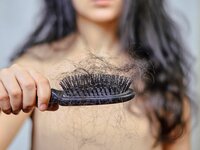There are no products in your shopping cart yet.
Hair loss or balding in women solution

Hair loss in women is a common problem with various causes. For many women, hair is an important aspect of their appearance and self-confidence, and hair loss can lead to insecurity. In this blog, we will discuss the causes of hair loss in women and offer possible solutions.
Causes of Hair Loss in Women
Hair Loss Due to Thyroid Problems and Iron Deficiency
Hair loss can be caused by medical conditions such as thyroid issues and iron deficiency. It is advisable to consult a doctor when you notice significant thinning of your hair, as these conditions can affect hair health.
-
Thyroid Problems:
- Hypothyroidism: In hypothyroidism, the thyroid is underactive and produces insufficient thyroid hormones, including T4 and T3. Low levels of these hormones can lead to hair loss and changes in the texture and growth rate of hair. Hair may become thinner and more brittle.
- Hyperthyroidism: In hyperthyroidism, the thyroid is overactive and produces too much thyroid hormone. This can also lead to hair loss and hair brittleness. People with hyperthyroidism often experience faster hair growth cycles, which can result in increased hair shedding.
-
Iron Deficiency:
- Iron is essential for the production of hemoglobin, the protein in red blood cells that transports oxygen throughout the body. Without enough iron, anemia can develop, leading to hair loss. Hair follicles need a constant supply of oxygen and nutrients to stay healthy. Iron deficiency can slow down hair growth, resulting in thinner hair.
Stress and Hair Loss
Stress can play a significant role in hair loss. Hair follicles are among the most active cells in our body and require a constant supply of oxygen, proteins, vitamins, and minerals. Stress hormones can reduce blood flow to the hair follicles, making the hair dull, limp, and difficult to style. Additionally, stress hormones can disrupt the natural hair growth cycle, causing hair to fall out faster than usual.
- Telogen Effluvium: Stress can lead to a condition called "telogen effluvium," where a large number of hair follicles enter the resting phase simultaneously. Normally, each hair follicle has a growth phase and a resting phase before shedding and being replaced by a new hair. When stress impacts the body, a greater percentage of hair follicles can enter the resting phase at the same time, leading to increased hair loss.
- Alopecia Areata: Stress can also contribute to the development of alopecia areata, an autoimmune disease where the immune system attacks the hair follicles, resulting in round bald patches on the scalp.
- Trichotillomania: This is a compulsive disorder where people pull out their own hair in response to stress or anxiety.
- Worsening Hair Growth: Stress can affect hair growth quality, making hair dull and brittle.
- Poor Nutrition: Under stress, some people may neglect their diet, leading to nutritional deficiencies that affect hair growth.
- Inflammation: Stress can trigger an inflammatory response in the body, which can harm the health of hair follicles.
Insulin Resistance and Hair Loss
Research has shown that insulin resistance can lead to an overproduction of male hormones in women, which can cause hair loss. Insulin resistance is a condition where the body's cells do not respond properly to insulin, the hormone that regulates blood sugar levels. This condition can affect various aspects of health, including hair loss in women.
- Hormonal Imbalance: Insulin resistance can lead to an overproduction of insulin to control blood sugar levels. This overproduction can, in turn, lead to increased production of male hormones, such as androgens, in women. Elevated androgen levels can promote hair loss.
- Androgenic Alopecia: Hair loss caused by increased levels of male hormones in women is also known as androgenic alopecia. This type of hair loss can result in thinning hair, particularly on the crown and temples.
- Oily Skin and Hair: Insulin resistance can also contribute to oily skin and hair. Excessive sebum production can lead to an oily scalp, making hair appear limp and dull.
- Inflammation: Insulin resistance is often associated with chronic inflammation in the body. Inflammation can negatively impact the health of hair follicles and contribute to hair loss.
Progesterone Deficiency and Hair Loss in Women
A condition called PCOS (Polycystic Ovary Syndrome) leads to the formation of small cysts in the ovaries, resulting in increased production of testosterone. This can lead to oily skin, acne, facial hair, and hair loss, often with bald spots. Even women without PCOS can experience hair loss due to a progesterone deficiency. A progesterone deficiency can disrupt the balance between estrogen and progesterone, leading to a relative excess of estrogen (estrogen dominance). This hormonal imbalance can affect hair follicles and cause hair loss.
Menopause and Hair Loss
During menopause, hair undergoes changes due to an imbalance between testosterone and estrogen. Before menopause, higher estrogen production keeps testosterone levels in check. After menopause, estrogen is only produced by fat tissue, resulting in an imbalance favoring testosterone. This leads to the conversion of testosterone into the stronger hormone DHT (dihydrotestosterone) in hair follicles, which inhibits hair growth and results in thinning hair and hair loss.
Solutions for Hair Loss in Women
-
Stress Reduction: Reducing stress is crucial for overall health and can help prevent hair loss. Practicing relaxation techniques such as yoga, meditation, and breathing exercises can reduce stress.
-
Hormone Therapy: For women in menopause, hormone therapy, such as using progesterone cream with phytoestrogen, can help restore hormonal balance and reduce hair loss.
-
Treatment of Insulin Resistance: Addressing insulin resistance can reduce the overproduction of male hormones and prevent hair loss. Transitioning to a low-carb lifestyle can help stabilize blood sugar levels.
-
Progesterone Cream for Hair Loss: The use of progesterone cream can be beneficial for some women, especially if there is a clear progesterone deficiency contributing to hair loss. Progesterone helps maintain hormonal balance and can protect hair follicles from the effects of DHT.
It's important to understand that the right approach to treating hair loss depends on the specific cause and individual needs, and it takes time to see results.
 English
English


